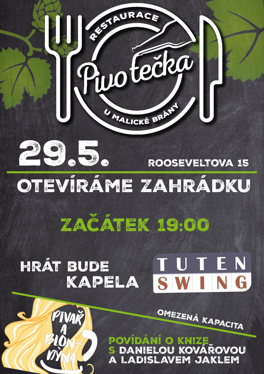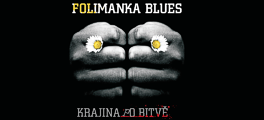|
The Last Generation
Publikováno 03.10.2023 v kategorii: Publikované články
Unless something fundamental is done to counter the current trends, we are the last generation. There will be no more because the world will end. We do not want to be the last generation, that’s why we have to stir up agitate.
We all feel that this is a kind of a marketing shortcut, an exaggeration, a symbolism. But there is a rational core in this idea. We are at a certain turning point, and there is a lot of data to prove it. The devastating trends have left us cold for a long time, until they have assumed fatal and apocalyptic proportions. Are we already experiencing signs of irreversible change or can we still do something at the last minute? I am rather a sceptic in this sense. In my view, we have already crossed the breaking point and we are going to keep going downhill. All the way to hell. And we are indeed the last generation, in many ways. Instead of stirring up today, it is time for some recapitulation. One would like to say a testament but who would it be for when we are the last generation, are not we? Yes. Apparently we are. We are the last generation that can read books. Which needs to read books. A generation that is not satisfied with scraps picked up on the internet but needs to turn one paper page after another. We are the last generation considering grammar the important matter. We are the last generation whose members are embarrassed when they make a mistake in their writing. The last generation that wants (and many succeed) to speak and write nice our mother tongue. We are the last generation that can keep on attention for more than two minutes, that can understand spoken and written speech, that can complete a coherent sentence, that can express a thought which has a beginning and an end and a meaning, finally. We are the last generation that communicates through sentences and not just with quotes, shouting and yelling. Or maybe the last generation that communicates at all. We are the last generation that is aware to give way to the elders at the door, to let the elder sit down, to greet the elder first. And that you are supposed to say hello and wish people a good day. Is not such a nice morning greeting a beautiful invention and an ornament of the day? We are the last generation that feels the need to see each other, to talk to each other, to shake hands, to hug each other, to kiss each other, to pat each other on the back, to toast each other. The last generation for which the word „friend“ means a close person we can rely on, love and help us, not an anonymous someone somewhere on the Facebook. We are the last generation for which the word sharing has a powerful and emotional content. Fate or suffering is shared, the good and the bad in life together are shared. Respect for virtues is shared, commitment to ideals is shared. Not that sharing means borrowing something for a fee or sending a picture of your lunch to strangers. We are the last generation to have something like a general social outlook. We can talk to each other about historical milestones or geography matters and we understand each other. We can classify decisive historical events and great individuals of the world history. That all generations lamented the same way? Of course they did. But that something qualitatively more fundamental has been happening now than before? That is very likely. This week, experts in sociometry, sociology and pathological social phenomena gathered on this subject at a seminar held on the floor of the Chamber of Deputies. And they were presenting the data. For example, Jonathan Haidt, a renowned and respected social psychologist engaging in morality and social emotions, was quoted. He is convinced, based on the study of data from many countries around the world that today’s breakthrough shift in educational and behavioural skills among the younger generation is a real and measurable phenomenon. One of Haidt‘s figures presented at the seminar was that since 2010, the prevalence of mental depression among teenagers in the US, Britain, Canada, Australia and New Zealand has increased by 145 per cent (girls) and 161 per cent (boys). Haidt puts this into context of 2012 when in one huge wave the modern world was hit by a flood of cheap „smart“ phones that parents could commonly afford to buy for their children. Surveys tell us that almost immediately IQs plummeted down among youngsters in many countries around the world in all standardized tests. Psychological disorders have skyrocketed, there has been a measurable breaking loss of the sense of satisfaction and happiness among the young, the number of self-harm and suicide among the young have skyrocketed. As a bitter afterthought, there was stated that more people commit suicide each year than are killed in wars, murders and acts of terrorism combined. Curiously, these breaks in the data come just as the social effects of the great global financial crisis of 2008-2009 have receded and living standards in the countries surveyed have begun to rise again. It is also true that in Europe, the incidence of social pathologies has risen more sharply in countries north of the Alps (including our own) than in the Mediterranean. Is it to do with the living standards, religion (Protestants versus Catholics) or a way of life? No, let us not look at the weather, there is always ugly in the North and nice in the South, whereas here it is about the changes occurring during the last ten years. Demands in schools are dropping down, testing is a relic, knowing something about the world around you is useless because „I can find it on the net“. The shallowness and superficiality of needs, relationships, goals, the unwillingness to strive for something, to sacrifice something, these are not the laments of grandpas and grandmas on write-offs, these are data and facts. The last generation. We are the last generation to feel any responsibility. Real, specific, not fanatically pseudo-religious. The generation that understands the value of things that genuinely cares about their loved ones and wants to take care of them. None of that will be here anymore. Genuine emotions will be replaced with kitschy poses. Talking will be replaced by babbling. Thinking will be replaced by dullness. Reading by placing „likes“. Work by parasitising. An honest piece of work a virtual substitute. Beauty by seductive obscenity. And you know what? Maybe that is not a bad piece of news at all. The generations before us could not have survived without strong muscles. Human strength was replaced by tools, domestic animals, mechanization, automation. So the atrophy of brute strength did not bother anyone. Except for those who lack adrenaline and feel the need to sweat sometimes, except in the sun. So what good is intelligence, education, general insight, the art of communication now? What is the point in a time when smart boxes will do it all for the next generation? Reason will no longer be needed, just as muscles are not so necessary today. So it is actually all right. Or is it not? Or is the feeling of being a member of the last generation not a victory? Unless something substantial is done against the current trends, we are the last generation. No more will come because it will be the end of the world. Ladislav Jakl, September 21, 2023
(L. J., Czech publicist, rock musician and brewing expert. Formerly a member of the Czech Chamber of Deputies, secretary to the President of the Czech Republic, now, among other things, a member of the National Broadcasting Council.) |




28. 02. 2026, 19.30 – Vagon klub, Staré Město: koncert rockové kapely Folimanka Blues v rámci Cimrfestu 28. 01. 2026, 15.00 – Pivovar Kutná Hora: L. J. předává cenu za vítězství v degustační soutěži o nejlepší český ležák První pivní extraliga za rok 2025 21. 01. 2026, 19.00 – Radio Beat: L. J. hostem živě vysílaného pořadu Uši Radia Beat 13. 01. 2026, 17.30 – Pivovar Urpiner, Banská Bystrica: degustační Superfinále o nejlepší ležák Slovenska a Česka První pivní extraligy 30. 12. 2025, 17.30 – Pivovar BadFlash, Kobylisy: L. J. předává cenu za vítězství v degustační soutěži O Krále Prahy První pivní extraligy 21 12. 2025, 18.00 – Česká televize: L. J. živě v pořadu Duel 17. 12. 2025, 16.55 – Čep&Pec, Nusle: prezentace pro podporovatele vinylového alba Odpočívej v pokoji rockové kapely Folimanka Blues 14. 12. 2025, 16.55 – Mimosa, Staré Město: slavnostní oficiální prezentace vinylového alba Odpočívej v pokoji rockové kapely Folimanka Blues 12. 12. 2025, 17.00 – Novotného lávka, Staré Město: L. J. předává Krameriovu cenu za nezávislou žurnalistiku 09. 12. 2025, 19.30 – Na Slamníku, Bubeneč: tradiční předvánoční koncert kapely Folimanka Blues 06. 12. 2025, 14.00 – První Pivní Tramway, Záběhlice: L. J. v porotě degustační soutěže První pivní extraligy o nejlepší ležák produkovaný na území hlavního města Král Prahy 05. 12. 2025, 16.00 – Rozhovor L. J. na Svobodném vysílači o novém albu kapely Folimanka Blues.
03. 12. 2025, 17.00 – pivnice Zlý časy, Nusle: L. J. účastníkem charitativní akce pivovarníků Veni, Vidi, Vici 02. 12. 2025, 18.00 – L. J. hostem pořadu NaHey ROCK na Rádiu Hey 27. 11. 2025, 15.00 – Strahovský klášterní pivovar, Hradčany: L. J. při předávání cen vítězům mezinárodní pivní degustační soutěže Golden Bohemia 25. 11. 2025, 17.00 – Břevnovský klášterní pivovar, Břevnov: L. J. v porotě degustační soutěže pro časopis Pivo, Beer and Ale 23. 11. 2025, 12.00 – Kulturní dům Kladno: L. J. v porotě největší soutěže kapel v živém hraní Skutečná liga 22. 11. 2025, 14.00 – Pivovar Hendrych, Vrchlabí: L. J. v porotě degustační soutěže domovarníků Hendrych 19. 11. 2025, 19.00 – Royal Theatre, Vinohrady, L. J. hostem při udělování Výročních cen Společnosti na obranu svobody projevu 16. 11. 2025, 11.00 – Areál Zemědělské univerzity, Suchdol, L. J. hostem výročního sněmu Svobodných 15. 11. 2025, 11.00 – katedrála sv. Víta, L. J. uctí památku zesnulého kardinála Dominika Duky 13. 11. 2025, 10.00 – Jihoměstský pivovar, Chodov, L. J. při udělování Výročních cen Sdružení přátel piva 25. 10. 2025, 14.00 – Pivovar Kocour, Varnsdorf: L. J. v porotě degustační soutěže v rámci 15. ročníku Ale Festivale 22. 10. 2025, 19.30 – První Pivní Tramway, finále šestnáctého ročníku degustace českých ležáků První pivní extraligy 18. 10. 2025, 14.00 – Pohořelec, L. J. účastníkem Memoriálu Matěje Kuděje 17. 10. 2025, 10.00 – Břevnovský klášter, L. J. členem mezinárodní poroty degustační pivní soutěže Golden Bohemia 09. 10. 2025, 20.30 – L. J. živě v pořadu Dualog, Slobodný vysielač 07. 10. 2025, 19.30 – První Pivní Tramway, druhé semifinále šestnáctého ročníku degustace českých ležáků První pivní extraligy 05. 10. 22.00 – L. J. živě v pořadu Události komentáře týdne na ČT24 22. 09. 2025, 19.30 – První Pivní Tramway, první semifinále šestnáctého ročníku degustace českých ležáků První pivní extraligy 17. 09. 2025, 17.00 – Grand hotel Prague Towers, Nusle: L. J. přednáší na semináři Volby po čtyřech letech Fialovy vlády pořádané Institutem Václava Klause 10. 09. 2025, 09.00 – Kaiserštejnský palác, Malá Strana: L. J. přednáší na konferenci o (ne)svobodě médií pořádané Společností pro ochranu svobody projevu 05. 09. 2025, 19.30 – The Stage Prague: koncert rockové kapely Folimanka Blues 31. 08. 2025, 12.00 – televize MVTV: L. J. v živě vysílaném rozhovoru s Mirkem Všetečkou 19. 08. 2025, 20.01 – Radio Beat: L. J. hostem živě vysílaného pořadu Zpovědnice 09. 08. 2025, 14.01 – Atommuzeum Javor 51, Míšov: rocková kapela Folimanka Blues zahraje na festivalu Atom Peace Fest 08. 07. 2025, 19.300 – První Pivní Tramway pivovar, degustace slovenských ležáků První pivní extraligy 17. 06. 2025, 19.00 – Břevnovský klášterní pivovar, degustace hořkých piv První pivní extraligy 17. 06. 2025, 14.00 – TV Protiproud, rozhovor L. J. s Petrem Hájkem v pořadu Rub a líc 09. 06. 2025, 10.00 – pivovar Velké Březno, Ústí nad Labem, L. J., předává ocenění za vítězství piva Březňák v česko-slovenském Superfinále První pivní extraligy 08. 06. 21.00 – televize XTV: L. J. v živém vysílání pořadu Xaver a host 02. 06. 2025, 18.00 – Zkušebna U Lukáše, Bartoškova 1571/31, Vršovice: veřejná zkouška rockové kapely Folimanka Blues pro přátele a podporovatele 12. 05. 2025, 10.00 – Dům kultury, Litoměřice, L. J., v degustační porotě soutěže Piva Ústeckého kraje 06. 05. 2025, 19.30 – První Pivní Tramway, páté kolo šestnáctého ročníku degustace českých ležáků První pivní extraligy 23. 04. 2025, 19.30 – První Pivní Tramway, čtvrté kolo šestnáctého ročníku degustace českých ležáků První pivní extraligy 09. 04. 2025, 19.30 – První Pivní Tramway, třetí kolo šestnáctého ročníku degustace českých ležáků První pivní extraligy 05. 04. 2025, 12.00 – Zámek Litomyšl, L. J., v porotě degustace národní soutěže domovarníků Litomyšlský korbel 25. 03. 2025, 19.30 – První Pivní Tramway, druhé kolo šestnáctého ročníku degustace českých ležáků První pivní extraligy 25. 03. 2025, 10.00 – L. J. se účastní posledního zasedání Rady pro rozhlasové a televizní vysílání v rámci svého šestiletého mandátu 21. 03. 2025, 18.00, Pivovarský dvůr, Zvíkovské Podhradí – L. J. v degustačním panelu soutěže Jarní cena českých sládků 16. 03. 2025, 22.00 – L. J. v živém vysílání pořadu Události komentáře týdne na ČT24 11. 03. 2025, 19.30 – První Pivní Tramway, první kolo šestnáctého ročníku degustace českých ležáků První pivní extraligy 07. 03. 2025, 09.00, Výstaviště Zahrada Čech, Litoměřice – L. J. v degustačním panelu mezinárodní soutěže Česká a Světová pivní pečeť 05. 03. 2025, 17.00, Grand Hotel Prague Towers – L. J. jedním z hlavních řečníků semináře Co nám naznačuje prvních šest týdnů Trumpova prezidentství 28. 02. 2025, 19.30 – Vagon Club, Národní třída: koncert rockové kapely Folimanka Blues v rámci večera pro zemřelé muzikanty Cimrfest 11. 02. 2025, 20.00 – L. J. hostem živě vysílaného podcastu Standa Show. 09. 02. 2025, 22.00 – L. J. v živém vysílání pořadu Události komentáře týdne na ČT24 01. 02. 2025, 19.30, (A)void Café, Náplavka u Jiráskova mostu, Nové Město – L. J. hostem Poslechového kalendária Michaela Kyselky 17. 01. 2025, 13.00, Pivovar Ferdinand, Benešov – L. J. předává pivovaru Ferdinand cenu za vítězství zdejšího ležáku v degustační soutěži První pivní extraligy pro rok 2024 13. 01. 2025, 17.00, Kbelský pivovar – L. J. předává Kbelskému pivovaru cenu za vítězství zdejšího ležáku v degustační soutěži První pivní extraligy Král Prahy 08. 01. 2025, 18.00 – televize A11, L. J. hostem pořadu Dobrý večer s A11 o politice i muzice |





























































































